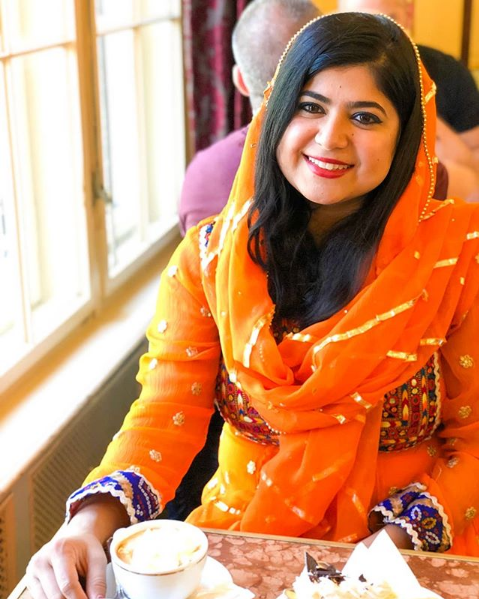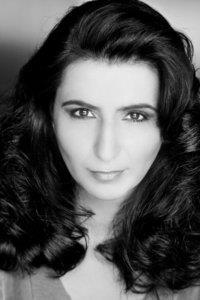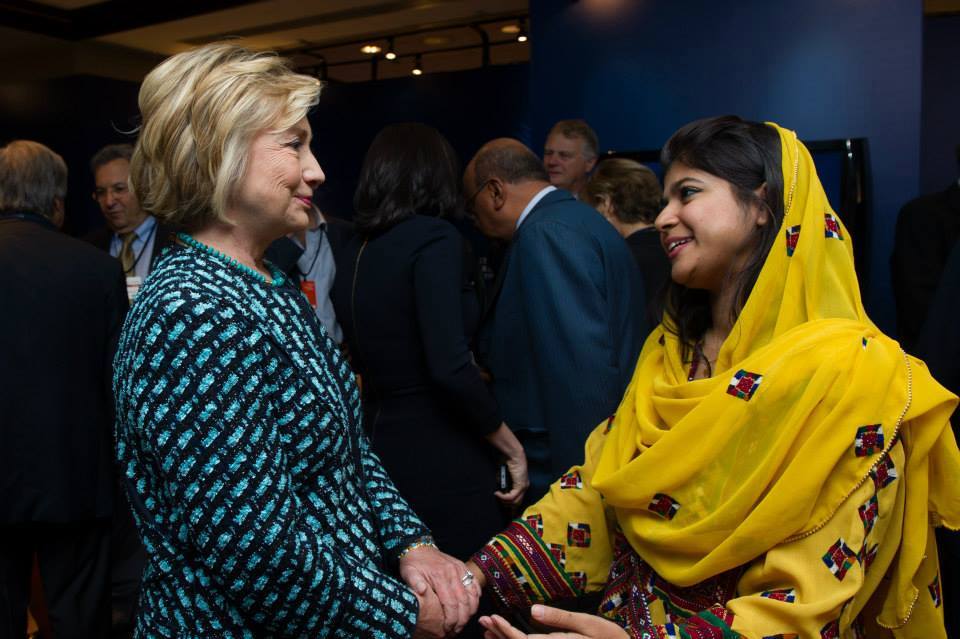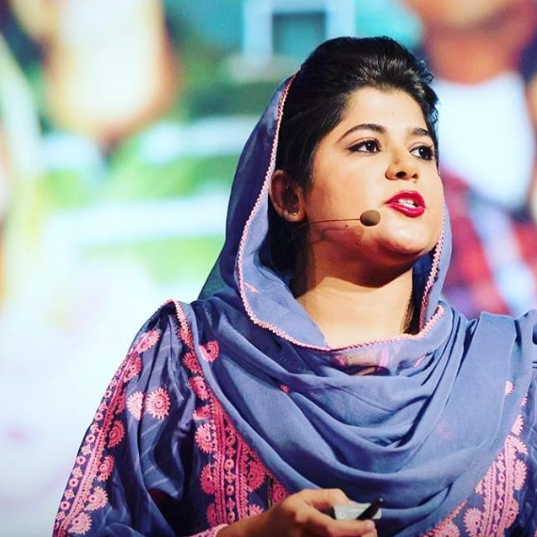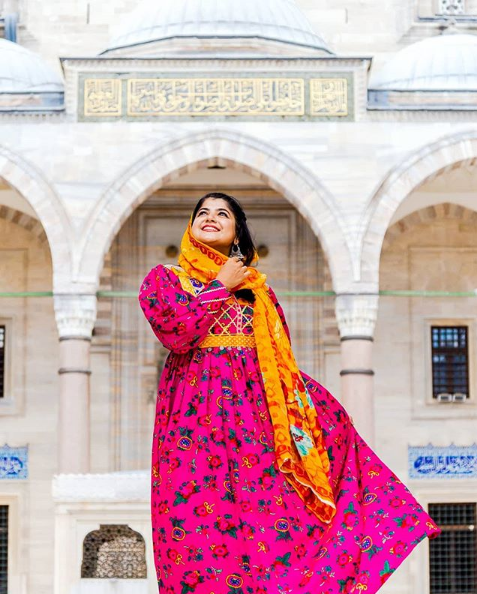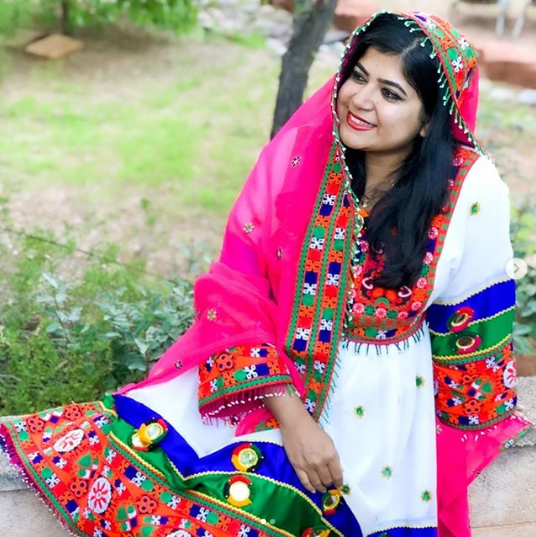Khalida Brohi
Pakistan
Award-Winning Women’s Rights Activist
And Social Entrepreneur In Interview
The interview was carried out by Çiğdem Gül
Germany – February 18, 2019
INTERVIEW
Çiğdem Gül: Dear Khalida, I am very pleased that I may interview you for my lecture about very well-known and successful women in Asia and Latin America at Europe’s leading fair for women 2019 named „women&work“ in Frankfurt / Germany and for my “Intercultural Network For The Highly Gifted”.
You are an award-winning women’s rights activist and a social entrepreneur, living in Pakistan and the United States. First I would like to congratulate you to your new book `I should have honor´. I am big fan of you and your NGO. You are a very inspiring, strong woman and a big enrichment for Pakistan and the whole world.
You grew up with the traditions of Pakistan, but also got to know the Western world and invested in human capital. You have studied and married an American man. How do you manage to endure the balancing act between these two contrary worlds and at the same time experience them as an unity and enrichment?
Khalida Brohi: It’s extremely disorienting to shift from one world to another that I do regularly. My life running my social enterprises (The Chai Spot) in the United States and my life running my non profit Sughar Foundation and going home to my siblings in Pakistan are extremely different. My cousins still live in the beautiful mountains of Balochistan and the people I call my own live surrounded by the tribal ways of life while I have made home in a place where people live alone and freedom is cherished. However what’s been extremely helpful in making this balance easier is the experiences of my childhood. My whole life I crossed many worlds constantly to get to where I am. When my father decided to leave our village to give us a life without tribal restrictions, he couldn’t afford to live in the city so we grew up in a slum community. The transition between the life in tribal mountains of Balochistan and the slum community in Sindh was extremely big; despite poverty my balochistani life was filled with traditions, indigenous wisdom and a different way of life than my life in the slums where I saw people live everyday with hardships of poverty and crime. Then when we could finally afford it, my father moved us to a small town where we started seeing the life of lower middle class and then when I was a teenager we moved to Karachi, the biggest city of Pakistan. This city was unlike anything I had ever seen and finally when in just a few years I started my journey towards fighting honor killings of women, I moved between the worlds of elite Pakistanis, politicians, international activists and entrepreneurs. All this prepared me for a life where I flourish in two extremely different worlds and move between them gracefully.
Çiğdem Gül: You are a member of the Brahui people, an indigenous tribe of Balochistan / Pakistan. To my knowledge, indigenous people feel responsible for Earth healing and sustainability. Was it the same in your tribe? If so, does this attitude of indigenous origin affect the working world of women? Is payed attention to sustainability in case of success? What kind of future prospects and success strategies do you have as an indigenous person for women in Europe and the USA?
Khalida Brohi: Yes, I grew up believing that our connection to this earth is precious and we should treat it like a debt. We are loaned the earth, the food, the water and even the sky we sleep under. This is why from a very young age, despite living in extreme poverty I understood the meaning of service and believed that anything that was given to me has to be returned in the form of service to the people and to the earth. Our indigenous culture is deeply focused on kindship, hospitality and kindness. This belief and upbringing became a big part of my success as an entrepreneur where I focused my attention on creating economic opportunities for women and youth and doing that sustainably.
Çiğdem Gül: To my knowledge, women in Pakistan work in an analogue world of work. What can women who live in a different world, i. e. western world with better working conditions, and who are much more flexible in their working environment through technology, even be able to make career and improve their career to learn from that women?
Khalida Brohi: One of the most inspiring things about women leaders in Pakistan is that they do 10 times more work to get to where they want. There are not only societies pressure and obstacles but there are economic issues that become a hurdle for them. I remember when I was trying to launch my non profit, every single day was a challenge. From there being no electricity at our humble home for me to iron my clothes for my meetings to me not being heard by male bureaucrats, or when waiting for the bus being catcalled on my way to a big conference or receiving threats from the tribal men when starting new projects in villages. Every single step is harder for women in my country but they persist and hence their success even the slightest is tremendous in my eyes. I truly believe if women around the world work together, they can achieve so much more.
Hillary Clinton and Khalida Brohi
Çiğdem Gül: I am also from an Islamic country. My first socialization was in Anatolia/ Turkey. Patriarchy is represented in our origin countries. There are also cases of honor killings in Anatolia, but not in the frequency as in Pakistan. According to “World Report 2015: Pakistan”, there are estimated 1.000 honor killings per year. Pakistan has one of the highest „honor“ murder rates worldwide. In a country like Pakistan, as a very young woman, advocating for women’s rights, must be more dangerous, isn`t it? What risks, resistors, obstacles and, if so, dangerous moments did you have to face?
Khalida Brohi: There are definitely many risks associated with a society deeply controlled by men. Social, economical and cultural hurdles stop women on every step they take. For me specially the first hurdle was being a very young girl from a tribe where women face extreme restrictions on their freedom to be allowed to start the work that I do. As a 16 year old girl and starting my career was a shock to my family and to my community but it took a lot of persistence to work through that resistance.
The second issue came when I started my advocacy campaign in the early years of my work and I had to face men everywhere I went, all the political and media groups were led by men and on many occasions I was the only girl in the room. This was deeply problematic for my parents and I constantly had to fight to not be harassed.
I faced issues in the community where fathers of the girls I was recruiting suspected me of Westernizing their daughters and taking them away from the religion.
The biggest issue came soon after when our offices were attacked because of this suspicion.
Overtime there has been death threats, bombings and harassment towards my team and me, but all of this was possible to overcome because I kept believing I have every right to be doing this as any man.
Çiğdem Gül: You created the Sughar Foundation, which is a non-profit organization which helps women in Pakistan learn skills related to „economic and personal“ growth. Please tell me which other projects you are managing and which tasks you will do in it. What results and successes have you achieved so far with your projects and work?
Khalida Brohi: Sughar – which means skilled and confident women believe in unleashing potential in women by giving them opportunities to rise up and become leaders in their homes and communities.
Sughar establishes Sughar HUBs in selected rural communities where each Center gives a 6 month course to tribal/rural women on value-adding the traditional embroidery, enterprise development and also provide basic education and literacy skills and raise awareness of rural women which build their capacities towards decision making and contribution in their households and lives.
Sughar also engages men in awareness raising and educating activities to help them understand women’s rights under Islam. In 2015, I registered my non-profit in the USA to create the Sughar Foundation that now works with partners on the ground in Pakistan to replicate the Sughar model across Pakistan. So far we have reached more than 1.000 women across Sindh and Balochistan.
Çiğdem Gül: Congratulations! That’s a very big achievement.
Çiğdem Gül: How is success defined in Pakistan for women in a professional context?
Khalida Brohi: Success is different for everyone. For the women I know, success is their ability to speak their minds without hesitation, to stand up for justice and to be heard. Success to me is seeing a society where women are honored and given equal status, not killed for honor.
Çiğdem Gül: What does „ethics“ mean in your culture and for you personally?
Khalida Brohi: I truly believe ethics and code of honor go hand in hand. The reason I fight honor killings of women by actually preserving honor is because without ethics, without our honor we will be nothing. In a society like ours, where majority of the nation fights poverty everyday, they have nothing but their honor. They cherish this honor and this honor holds them accountable not to turn to crime or violence in the time of desperation. However sadly, from centuries while honor has been a huge topic in our communities, it has only been attributed to men. That is what I don’t’ agree with and that is why I named my book „I Should Have Honor“, because honor is not a man’s inheritance, every woman should have honor, because as women we are the better preservers of honor.
Çiğdem Gül: Do you think that for women in Europe and the USA the digitized world of work, technical progress and working culture are compatible with the pursuit of ethics and humanism?
Khalida Brohi: Unfortunately, I can not answer this question.
Çiğdem Gül: Benazir Bhutto was a Pakistani Prime Minister in the 1990s, becoming the first woman in Pakistan to hold the highest office in the country. How did women’s advancement opportunities develop in Pakistan, in society, politics and the economy? Did the professional advancement opportunities for women in Pakistan become easier or more difficult after Benazir Bhutto? And why?
Khalida Brohi: Benazir Bhutto was a true turning point for my country. There was a huge shift in the mindsets when she took office and when ever she spoke to the crowds, there were thousands and thousands of men who went home and bought her posters and framed them and put it on their walls. She was not only a hope for the nation but a great new light in the mindsets, a possibility that someday their daughters could also be like her.
The best part about Benazir Bhutto was that she came from one of the extremely conservative districts in Pakistan, each time she spoke of her village and her life, people in similar communities thought she could be anyone, she could be their daughters and their wives. From the very beginning of her career to this day Benazir Bhutto has been and is the role model for thousands of women in my country.
Çiğdem Gül: What is the situation of gifted and highly gifted women in Pakistan? Are there any funding opportunities there?
Khalida Brohi: Pakistan is gifted with endless number of women and girls with incredible talent and skills, anywhere you go in my country, you will meet women who will shock you with their beliefs and all they are able to achieve. But the saddest part is, majority of these women do not get the opportunity to ever to do the things they believe in. Along with it, being a male dominated society, the opportunity gap in Pakistan is huge where many incredible young girls miss out because they don’t have access to either wifi or technology or sometimes transportation. This is the biggest reason at Sughar our main focus is to bring those opportunities to these women and unleash that potential in them.
Çiğdem Gül: Dear Khalida, thank you for our conversation. I am very impressed by your answers. I am also enthusiastic about your empathy, depth and maturity at such a young age.
Merci, that our worlds were allowed to meet together. I learned more about you and your untiring commitment in Pakistan and the USA in my interview.
In the professional context, on behalf of all women in Europe and America, I would like to thank you for giving us success strategies from Pakistan.
Please refer to Khalida Brohi´s webseite for more detailed information:
Website: https://www.khalidabrohi.com/
Special Note
All photographs are 2019 © Courtesy of Khalida Brohi (Pakistan / U.S.)
Çiğdem Gül, born 1971 in Gümüşhane / Eastern Turkey is a Turkmen nomad with Alevi-Turkish origin, Persian roots and German citizenship. She spent the first years of her life in a small village in Anatolia. Back then there was no infrastructure, no shops, no library, no electricity, no heating, no hot water, no sink, no television, no telephone, no dining table on four legs and no kindergarten. But a high rate of child mortality and a different sense of time. She is lucky enough to be one of the surviving children who had the priceless luxury of also living in Eastern civilization. She was 4 years old, when her family immigrated from Turkey to Germany. Çiğdem Gül grew up in Duisburg / Germany and went through her school career there.
Çiğdem Gül is a graduate Economist, Change Management Consultant, Business Coach, Founder of the worldwide „Intercultural Network For The Highly Gifted“ (INHG) and Journalist for language combination Turkish, German and English.The spectrum of Çiğdem Gül´s previous professional fields extends in the areas of Business Administration and Economy – Law – Business Consulting, Business Coaching, Intercultural Coaching, Training – Public Relations – Art, Culture and Theatre.
With her humane, multi-perspective and multicultural attitude, Çiğdem Gül always looks at all issues from the perspective of human rights. And so it happened that on May 4th, 2019 she gave her lecture „Ethics for She-Conomy: Success Strategies from Developing Countries“ in Frankfurt am Main / Germany at Europe’s leading trade fair congress for women and career „women&work“ on the main topic „Humanism 4.0″. Her presentation was based on her multilingual, personal interviews with very well-known and successful women in Argentina, Colombia, Pakistan and Turkey.
Please refer to Çiğdem Gül´s webseite for more detailed information:
Website: www.interkulturellhochbegabte.de
E-Mail address: info@interkulturellhochbegabte.de
